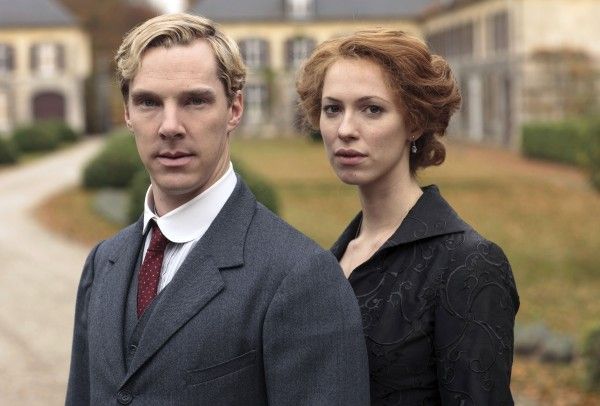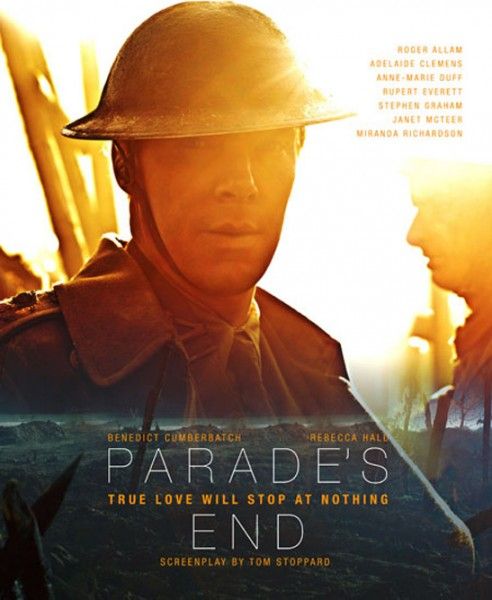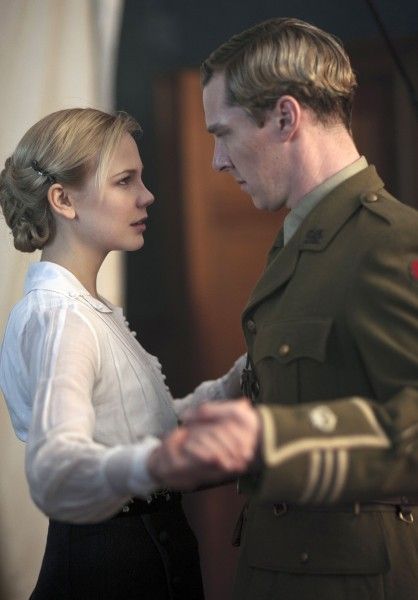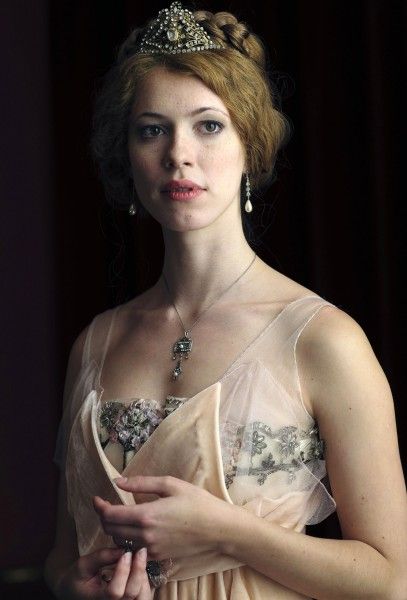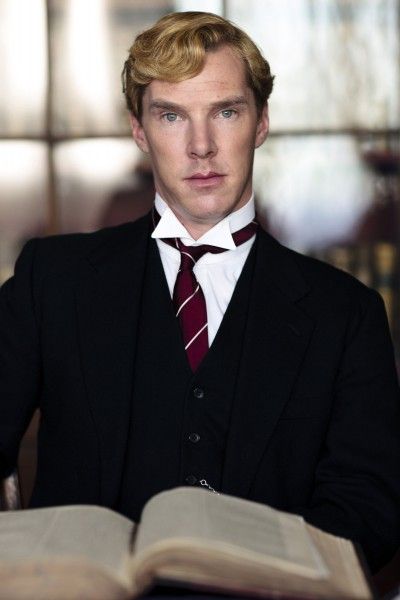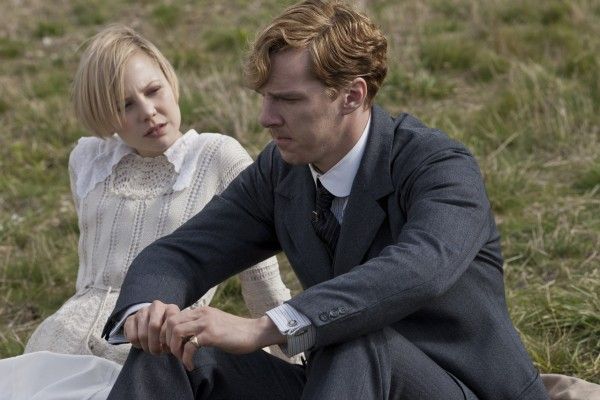Set against a backdrop of impending catastrophe in the early 20th century, Parade’s End (airing on HBO from February 26th through 28th) tells the story of English aristocrat Christopher Tietjens (Benedict Cumberbatch), who is trapped in a marriage to an unfaithful wife while being torn over his unspoken love for a fearless, young suffragette. Sylvia (Rebecca Hall) is a callous socialite who has given birth to a child that may not be his while Valentine Wannop (Adelaide Clemens) is a fearless young woman who unexpectedly turns Christopher’s world upside down. As the First World War breaks out across Europe, Christopher struggles to adapt to his new life as an army officer and attempts to hold onto sanity and meaning, as the old world order collapses amidst tremendous upheaval, marking the end of Edwardian ideals and bridging the gap between feudal England and the dawn of modernism.
During this recent exclusive interview with Collider, director Susanna White talked about how she came to direct this five-part mini-series, whether her work on HBO’s Generation Kill helped prepare her for the epic undertaking, the challenges of centering the story around a character who really keeps his emotions inside and still getting audiences to fall in love with him, why she wanted Benedict Cumberbatch for the lead role, having two multi-faceted and complicated female characters, the logistics of shooting the battle sequences, shooting the film on digital, and breathing a sigh of relief once it was all put together and done. Check out what she had to say after the jump.
How did you come to direct this project?
SUSANNA WHITE: It was a bit like diving off a diving board. I just had to say, “Okay, I’m going to embark on this. Take a deep breath, and here we go!” I was sent the scripts and I absolutely fell in love with them. From the first 10 pages of Episode 1, I knew it was something I had to make. I loved the scale of it. It’s epic quality. It felt like it was about such important issues, and it spoke to me, very personally, in terms of all the things it says about women and about Britain. I also loved Tom Stoppard’s writing. It’s a very emotional piece of work, and it’s very funny. The biggest challenge in directing it was playing those tonal shifts between the comedy and the emotion. I just couldn’t stop and think, “There’s going to be 110 actors and 146 sets, and I’m going to be directing solidly for 15 weeks, trying to hold it together.”
We shot it multi-episodically. Because we had to shoot Rebecca Hall in seven weeks, I was shooting bits of Episode 5 before I’d done scenes from Episode 1, so it was this amazing movie to keep in my head. Somehow, I had to hold all these storylines and characters together. It was massive and, by the end of the shoot, I was on my knees. I don’t think I’ve ever been so tired, on any shoot, ever. Just the scope and the scale of shooting through the winter with lots of exteriors and shooting in the trenches, it was freezing cold.
But, Tom Stoppard was a huge resource and he was great. He was always either on the end of a phone, or very available. The script was dense and difficult, so it was great to have him there to explain stuff sometimes. I compare working to Tom to working with David Simon. When I first read the scripts for Generation Kill, I was like, “Woah, I’m not sure I understand everything that’s going on here.” There was a lot of subtext and a lot of layers beneath the surface. I had a very close relationship with David Simon on Generation Kill, and it was the same with Tom. It was always about being clear in the intention of what was at the heart of any scene.
Did it feel like Generation Kill prepared you for Parade’s End?
WHITE: It was easier, to be honest. People have said to me, “How on earth did you make Generation Kill?,” but this was actually a lot harder than Generation Kill. Generation Kill only had 35 characters and a set of Humvees. We had this traveling circus that went through Africa. But, the scale of Parade’s End was just huge. I think it’s the biggest piece of work I’ll ever do.
Did Parade’s End make you want to do a really small movie with only a couple of characters next?
WHITE: Definitely, my next goal is to make a single movie. I don’t know how many people will be in the movie, but 90 minutes would be great.
Was it challenging to center this mini-series around this character who really keeps his emotions inside and still get audiences to fall in love with him?
WHITE: That was almost the biggest challenge. It was a big casting challenge. There were less than a handful of actors who could have played that role. Christopher is so buttoned up and so self-enclosed, and yet you have to really care about his situation. I knew Benedict [Cumberbatch] could do that. It was also important to me that he was really attractive. In the book, Christopher is described as a big, baggy bolster, who is a fat ox. I wanted women to really fall in love with him, so it was important to find somebody who would be both attractive and who also could play the emotional layers and have the intelligence. Tom’s writing is not straightforward. It’s like watching a great athlete who makes the high jump look effortless. All the actors in Parade’s End are people who are really at the top of their game and who could make something difficult appear easy. When people came in to audition, it really sorted out the sheep from the goats because there were people that really struggled with the dialogue. I think Benedict is one of the finest actors of his generation, and we were really lucky to get him because without him, Parade’s End would be nothing like it is.
Was it difficult to convince people to let you cast Benedict Cumberbatch, since he wasn’t as known as he is now?
WHITE: It was a very expensive show, in TV terms, especially for the UK where people aren’t used to these big budgets. We needed a level of casting, in order to secure the financing. HBO were always very aware of him, as a theater actor. They’re very well-informed. But, when we started out the process, he didn’t have the profile. Because it took awhile to come together, by the time we were actually saying, “Okay, these are our shooting dates,” suddenly Benedict’s career had taken off into the stratosphere and it wasn’t a question of whether he was going to have the profile, it was a question of whether we’d be lucky enough to secure him. Within a year, he’d gone from being a respected theater and TV actor to someone who had become a Hollywood star. Now, he’s somewhat off in the stratosphere.
How great was it to also tell the story of two such multi-faceted and complicated female characters?
WHITE: That was something that was very important to me, actually, in making it. Because of the whole issue with the rise of the women’s movement, Sylvia (Rebecca Hall) was so trapped by the time she was born. There was no alternative for her except marriage, and if that marriage doesn’t work, there’s nothing. The stakes were so high. And then, Valentine (Adelaide Clemens) was very much the face of the future and a woman who could value herself for other things than just being a wife. I thought Rebecca was really remarkable, how she played those layers of the character. It would be easy to make a Sylvia who’s just a bitch that you don’t sympathize with, and Rebecca really understood that situation. In the UK, it was great because people were following it and didn’t know who to root for. There were points when people wanted Christopher (Benedict Cumberbatch) to stay with Sylvia, and then other people wanted him to be with Valentine. It was really interesting, how it divided the public, which is great because it shows we did something right.
What was it like to have Adelaide Clemens want to play Valentine so much that she really pursued the role and wouldn’t take no for an answer?
WHITE: Christopher was hard to cast, in one way, but Valentine offered challenges, in another way, because she needed to feel very fresh and like the face of the future and have an otherness about her. Where Sylvia is caught in all the restraints of Edwardian England, I wanted Valentine to feel very modern. We looked around in England, and then we cast the net wider. I actually found Adelaide through my agent (in the States), UTA. Someone had suggested her. I looked at her work and really enjoyed it, and then I did some Skype calls with her. And then, she flew over and met with Tom Stoppard.
It was a big process. It’s always a challenge. There were questions asked in Britain about whether you could have an Australian playing British, just in the same way that when I cast Alex Skarsgard in Generation Kill, they had those same questions about whether a Swede could play an all-American character. For me, I always cast for the spirit of an actor and whether their central being is close to who the character is. Adelaide is so beautiful that she just lit up the screen, and she had this otherness about her. Funnily, (author) Ford Maddox Ford had modeled the character on an Australian painter he fell in love with, who became his partner, and we ended up casting an Australian to do it. It’s funny how that worked out. She won us all over.
What was it about Rebecca Hall that made you want her to play Sylvia?
WHITE: With Sylvia, it was very, very important to me that you would care about her. If Sylvia was just a bitch, you’d think, “Well, why doesn’t Christopher just leave her?,” in Episode 1. I really wanted to reach out to a modern audience who would have a sense of understanding of what life would be like to be a woman then, that there’s no alternative apart from marriage, and that they’d really sympathize with her. If Sylvia were born now, she’d go to university and she’d have a range of things she could do with her life, other than be married to Christopher. But then, to be a woman whose marriage didn’t work, she’d be ostracized by society, which is very lonely. And Rebecca Hall has such intelligence and such extraordinary ability. She is really, really one of the world’s great actresses. She played those scenes with such subtlety. I’m so proud of the work she does in Parade’s End. I think she’s incredible. And what a privilege for me to work with her and Benedict, exploring those characters over the five hours. I say that I want to do just one movie next, but this was remarkable. To explore those characters over five hours, with the level of depth that we got into, was an amazing experience. It was a real adventure.
How challenging was it to do these battle sequences?
WHITE: I love doing battle sequences. Ever since Generation Kill, I have this appetite for action. It was a deliberate choice to make them feel claustrophobic. Tom and I went out to visit Kathleen Kennedy on the set of War Horse when they were shooting in Britain, and I came away from that thinking, “Oh, my god, here’s a huge piece of work being done about the First World War, there’s no way that we can compete with the scale that Steven Spielberg is doing it in. I’ve got to think laterally.” So, I went back to a lot of documentary photographs of the trenches and realized how small they were, and I decided I was going to play that claustrophobia. Unlike Steven, who built these super-wide trenches that he could get a tracking vehicle and a galloping horse down, I did the opposite. So, I worked with cranes and made them the size they were, where only two people could just pass within the trench. We couldn’t physically get a cameraman down there, so we shot with cranes.
I was very pleased with the fact that it had a claustrophobia. We built the trenches and I had a model of the trenches, so that I could extensively plan the shots in the evenings with the crew. You have to be controlled when you’re doing actions and explosions. You have to storyboard and have a strong element of control. So, I really enjoyed doing that section because, and I know it sounds weird, but it was calmer than the rest. For me, the action always comes out of caring about individual characters. One of the things I’m proud of is that you really see the mental effects of war on people. You see Christopher, the cleverest young man in England, losing his mind from the effects of war, which I suppose you would call PTSD now. It’s such a great novel about the First World War because Ford actually experienced it and it’s a first-hand account of what happened.
When this was all finished, did you breathe a sigh of relief?
WHITE: It was interesting because I was so tired. When I sat and watched it, I did have that feeling of, “My goodness, how did we pull that off?!,” because it was huge. And for me to direct all five hours, it was massive, but I wasn’t going to let anyone else do it because I loved it so much. I wouldn’t share it because I cared so passionately about it. I think it would have been physically impossible to have more than one director because of the way we shot the multi-episodic format. It wouldn’t have carved up in a way that you could normally do that. With Generation Kill, we split it up because there were different episodes in different places and you could divide it that way, but this just didn’t work that way.
Have you always wanted to be a storyteller?
WHITE: Yeah. When I was eight years old, I knew I wanted to make films. I went to watch a TV show in Britain, called Crackerjack, and I remember the other kids in the audience being desperate to get up on stage. I’ll never forget the moment when I saw a red light go on, on the camera, and that image translated to the monitor, and then a different light went on and the shot changed, and I went, “Wow, that’s how it’s done! That’s how that gets to my TV! This is what I want to do with my life!” I literally had that moment of epiphany, at eight years old. So, I went home and begged my parents to buy me a Super 8 camera and I started making movies. I knew that’s who I was. The hard thing has been convincing the rest of the world to let me be who I am. It took awhile for me to get started, but I’m very lucky because I’ve gotten to pursue that dream.
Do you find working with the actors pretty easy?
WHITE: I was nervous, coming out of documentaries. Unlike a lot of British directors, I hadn’t done any theater. But, I had a great mentor who said, “What you’re looking for is exactly the same thing you’ve done in your documentaries, which is moments of emotional truth. That’s your touchstone.” Good acting should be invisible. You shouldn’t be aware of the acting. It should feel real. Authenticity is what I’ve always gone after in my work, and I understand what feels emotionally right, instinctively. Working with actors has just come with experience. I absolutely love actors, and I love working with actors now. But, everyone has to find their own way into it. That was my way of working at what felt truthful, emotionally.
Does it ever actually get any easier to make a film?
WHITE: I think you have to be scared every morning that you go out to shoot, or you lose your edge. With actors, there has to be that adrenaline and you have to keep challenging yourself, and I certainly challenge myself, as a director. I move across different types of filmmaking. I think some of the technical aspects have gotten easier. With this, I shot on digital, for the first time, and that was a new experience. I think the biggest thing is just making sure that you do the work that you connect with, personally, and that you do work where you can really bring something to the table. It’s just about being truthful to yourself and saying, “No, I’m not going to take that movie because that’s not the one I should make. I’m just going to hold out a bit longer.” It’s having the strength of mind to hold out for the right projects.
What was your experience with shooting on digital? Is it something you’d want to do again?
WHITE: I really enjoyed it, actually. I enjoyed the immediacy of seeing what I was getting. It was a really positive experience. I definitely would do it again. We had a few teething problems, early on, when we had some cameras breaking down in wet weather, but by and large, it’s been great. You can create anything out of it. The world is your oyster, really.
Parade’s End airs from February 26th through February 28th on HBO.

